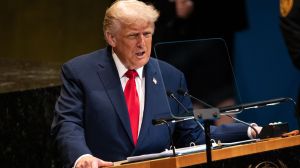Harry Potter all set to reach $ 1 billion mark
Deathly Hallows Part 2 is not only likely to break the records of the previous films in the franchise but is also slated to be the top earner.
Harry Potter finished his Hogwarts school days with box-office highs around the world. The question is whether the young wizard can continue to work his charms on audiences now that so many fans already have seen his big-screen finale.
When a film opens to colossal numbers such as the record $169.2 million weekend domestically for Harry Potter And The Deathly Hallows: Part 2,it usually has nowhere to go but down and sharply in its second weekend. Conventional wisdom is the bigger they open,the harder they fall, said Paul Dergarabedian,an analyst for box-office tracker Hollywood.com. Theres no way they can sustain it.
Still,distributor Warner Bros predicts the finale will easily top $1 billion worldwide,joining only a handful of films that have reached that level.
The film is almost halfway there already. Adding in its record international income of $312.3 million,Deathly Hallows: Part 2 was closing in on $500 million after just days in release. Domestic revenues for the last three of the seven earlier Harry Potter films fell about 60 per cent in their second weekends,a steep drop but typical of many blockbusters that count on opening weekend for a huge portion of their total income. Because of its record launch,the finale could drop even further,down as much as 65-70 per cent next weekend,said Dan Fellman,head of domestic distribution at Warner Bros. After that,Fellman expects it to settle in for a long run,drawing repeat business from fans and even luring those who have not come out for earlier Harry Potter flicks.
One thing I can tell you about the Potter movies is that the pictures are very front-loaded, Fellman said. But this is different because,one,its so well-reviewed,and two,its the last one in the series. And you can see this movie if you havent seen the others and still appreciate it.
Opening weekends for the past Harry Potter films varied widely,from $77.1 million for 2007s Harry Potter And The Order Of The Phoenix to $125 million for Deathly Hallows: Part 1 last fall. Yet the films have played out consistently in the long haul,their total domestic earnings ranging from about $250 million to $317 million. Deathly Hallows: Part 2 is virtually certain to shoot past those levels and become the franchises top earner,no matter how big a drop it takes next weekend,when it faces fresh competition from Paramount Pictures superhero tale Captain America: The First Avenger.
Of the $295 million total for Deathly Hallows: Part 1,42.4 per cent came from opening weekend,according to Hollywood.com. If Deathly Hallows: Part 2 matched that,it would finish at about $400 million,potentially becoming the first in the series to pass that rare benchmark.
Like the recent Harry Potter films,Hollywoods other top debuts took sharp drops in their second weekends. Revenues for 2007s Spider-Man 3 fell 62 per cent in the second weekend,with the opening weekend accounting for 44.9 per cent of total domestic income of $336.5 million.
Boy wizards films cross $7 billion box-office mark
The eight Harry Potter movies have earned more than $7 billion at the box office,Warner Bros said,cementing their place as the biggest grossing series ever. Although the total does not take into account inflation,and attendance figures have generally declined throughout the series according to some analyses,the franchise has been a major success for the Hollywood studio. Dan Fellman,Warner Bros. Pictures President of Domestic Distribution,called the tally a stunning achievement. Warner made all eight of the Harry Potter movies which are closely based on the seven novels by British author J.K. Rowling.
The studio decided to split the final book,Harry Potter And The Deathly Hallows,into two movies,the second of which hit theatres on July 15. It is the first of the boy wizard stories to be available in 3-D.
The end of the franchise raises questions about what might take its place at Warner and in Hollywood generally,although a senior Warner executive has said the studio would rely partly on its DC Comics unit to fill the void.
Fellman said in a statement that Warner had also reached the $1 billion box-office mark in North America for the 11th straight year.


- 01
- 02
- 03
- 04
- 05





























